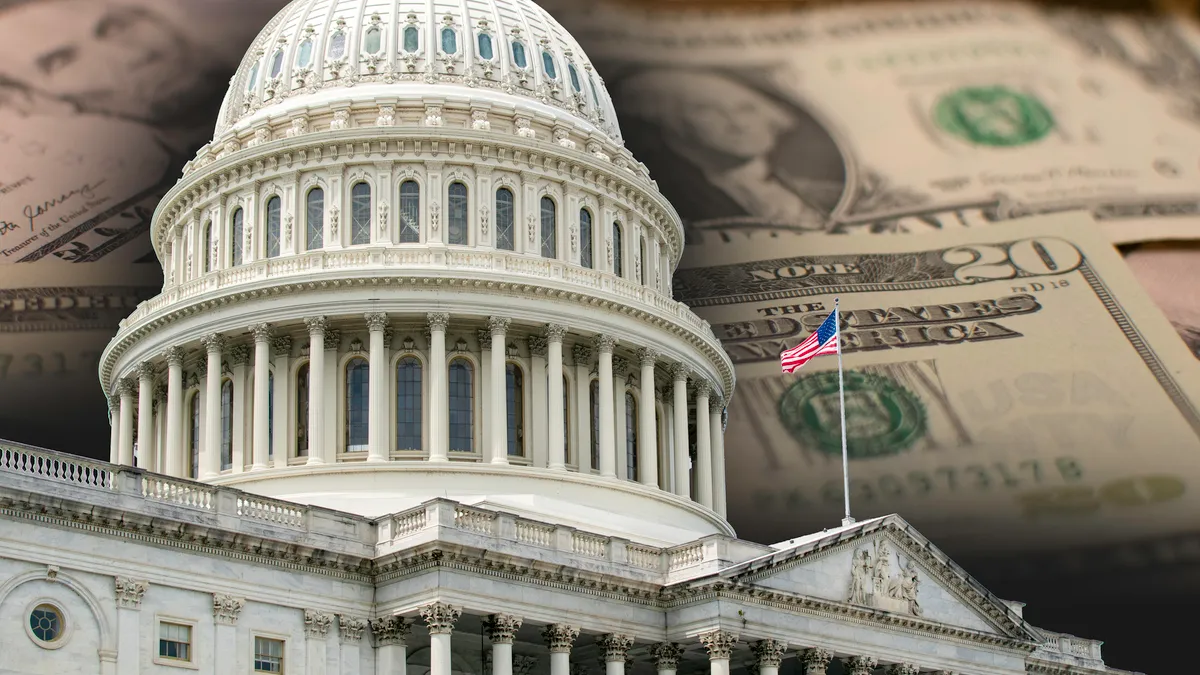Dive Brief:
- Tax breaks for corporations pursuing mergers and acquisitions have come in the crosshairs of a bipartisan assault in the U.S. Senate as the Biden administration and lawmakers in both parties aim to reverse a trend in corporate consolidation.
- Senators Sheldon Whitehouse, D-R.I., and J.D. Vance, R-Ohio, have introduced legislation that would eliminate tax exemptions for deal-making by many companies with average annual revenues exceeding $500 million.
- “Record numbers of giant corporate mergers have created an anti-competitive economic landscape,” Whitehouse said in a statement. “The families who get stuck paying higher prices as a result of these mega-mergers should not also have to foot the tax bill for them. Our bipartisan bill will end a massive tax giveaway for giant corporate mergers and get our government out of the business of subsidizing corporate consolidation.”
Dive Insight:
The Biden administration since its early months has targeted monopoly pricing and consolidation across a range of industries, from agriculture and information technology to health care and telecommunications.
For example, the Justice Department sued Apple on Thursday, claiming it wielded a monopoly with its iPhone. Also, the Consumer Financial Protection Bureau this month cracked down on banking junk fees, enacting a final rule that it says will cut average credit card late fees to $8 from $32.
Under Biden, the Justice Department and Federal Trade Commission have intensified the review of proposed deals. In December, they released guidelines for mergers that Attorney General Merrick Garland said would help “safeguard competition and protect all Americans.”
During the past decade, several large corporations have pushed through deals and paid little or no tax on the transactions, Whitehouse and Vance said. They cited the $19 billion acquisition of WhatsApp by Facebook in 2014, AT&T’s $85 billion purchase of Time Warner in 2018 and Canadian Pacific Railroad’s $31 billion acquisition of Kansas City Southern in 2021.
“Massive corporate mergers rarely produce their promised benefits but often leave American workers and families behind,” Vance said in a statement. “It’s past time to close the unfair loopholes that allow these deals to escape tax liability.”
When a company acquires or merges with another, it usually pays tax on the appreciated gain of stocks or assets held by the target firm, according to Whitehouse and Vance. Yet if the acquiring firm structures the deal so that it is exchanging stock, the appreciated value of the target company’s stock or assets may be fully tax exempt.
“This tax free structure is a popular way for giant corporations to skirt tax responsibilities,” the senators said, noting that since 2007 as much as 40% of the value of U.S. mergers has involved the low- or no-tax structure.
Whitehouse and Vance introduced the legislation amid signs of a recovery in M&A.
Deal-making surged 41% during last quarter compared with Q3 and may continue to rebound from a slump last year as deal-makers seeking to shake up corporate strategies begin to deploy $2 trillion in available private equity capital, McKinsey said last month.
The rapid spread of artificial intelligence, growing emphasis on sustainability and emergence of a “demanding, tech-enabled consumer class” will likely underscore the superiority of dealmaking in achieving strategic goals compared with organic growth, Jake Henry and Mieke Van Oostende, co-leaders of McKinsey’s global M&A practice, said in a report.
M&A will likely show signs of life this year, S&P Global Market Intelligence said in a report last month. “The extremely small number of transactions in 2023 will make year-over-year comps in 2024 easy to surpass.
“Large deals will continue to face hurdles, especially in the US where antitrust concerns have been a focus of regulators,” S&P Global said. “Still, an end to central banks’ rate-hiking cycles, along with greater economic clarity, would lead to more transactions.”












